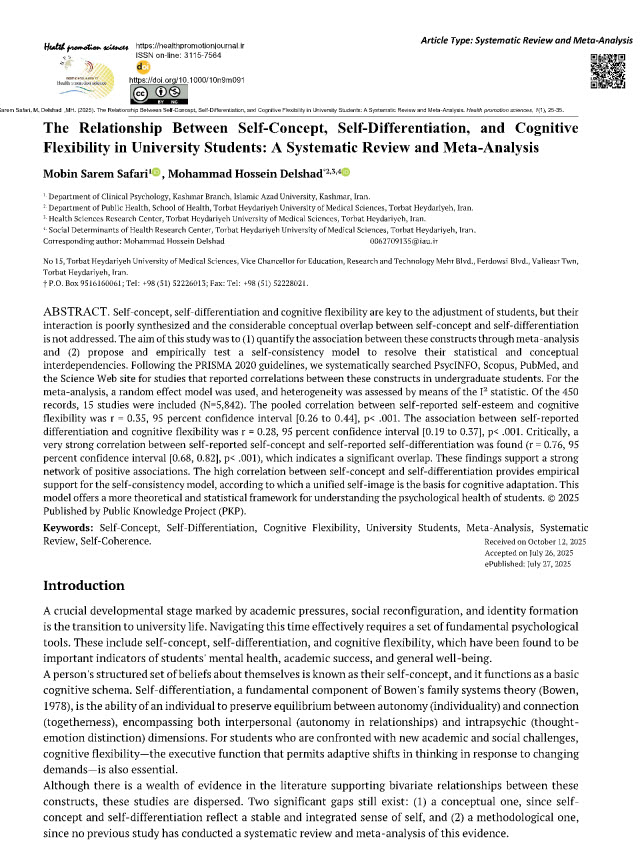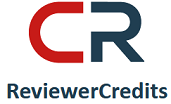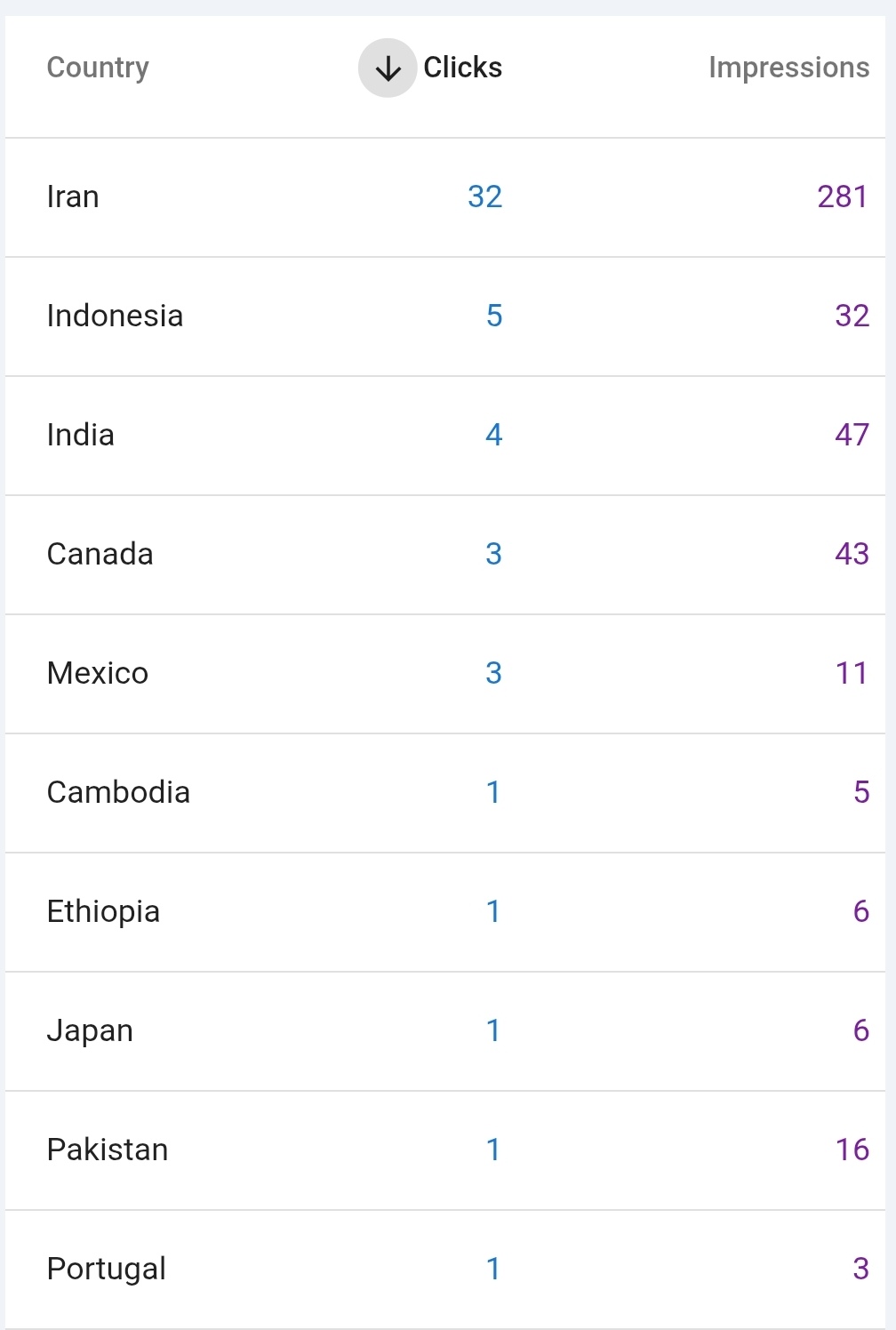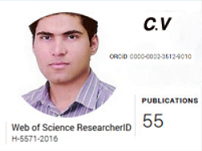The Relationship Between Self-Concept, Self-Differentiation, and Cognitive Flexibility in University Students: A Systematic Review and Meta-Analysis
Quantifying the Role of Self-Coherence as a Latent Predictor of Cognitive Adaptability
DOI:
https://doi.org/10.1000/xvfmrr24Tóm tắt
Self-concept, self-differentiation and cognitive flexibility are key to the adjustment of students, but their interaction is poorly synthesized and the considerable conceptual overlap between self-concept and self-differentiation is not addressed. The aim of this study was to (1) quantify the association between these constructs through meta-analysis and (2) propose and empirically test a self-consistency model to resolve their statistical and conceptual interdependencies. Following the PRISMA 2020 guidelines, we systematically searched PsycINFO, Scopus, PubMed, and the Science Web site for studies that reported correlations between these constructs in undergraduate students. For the meta-analysis, a random effect model was used, and heterogeneity was assessed by means of the I² statistic. Of the 450 records, 15 studies were included (N=5,842). The pooled correlation between self-reported self-esteem and cognitive flexibility was r = 0.35, 95 percent confidence interval [0.26 to 0.44], p< .001. The association between self-reported differentiation and cognitive flexibility was r = 0.28, 95 percent confidence interval [0.19 to 0.37], p< .001. Critically, a very strong correlation between self-reported self-concept and self-reported self-differentiation was found (r = 0.76, 95 percent confidence interval [0.68, 0.82], p< .001), which indicates a significant overlap. These findings support a strong network of positive associations. The high correlation between self-concept and self-differentiation provides empirical support for the self-consistency model, according to which a unified self-image is the basis for cognitive adaptation. This model offers a more theoretical and statistical framework for understanding the psychological health of students.
##plugins.themes.default.displayStats.downloads##
Tài liệu tham khảo
Bowen, M. (1978). Family therapy in clinical practice. Jason Aronson.
Donahue, E. M., Robins, R. W., Roberts, B. W., & John, O. P. (1993). The divided self: Concurrent and longitudinal effects of psychological adjustment and social roles on self-concept differentiation. Journal of Personality and Social Psychology, 64(5), 834–846.
Eskandari, H., Gholami, M., & Heidari, F. (2016). Explanation of psychological problems based on cognitive flexibility and self differentiation. Journal of Clinical Psychology, 8(4), 1-10.
Fu, M., Miyamoto, Y., & Mrazek, A. J. (2007). Asian and European American cultural values, collective self-esteem, acculturative stress, cognitive flexibility, and general self-efficacy among Asian American college students. Journal of Counseling Psychology, 54(4), 420–432.
Genet, J. J., & Siemer, M. (2011). Trait resilience, stress, and cognitive vulnerability to depression. Personality and Individual Differences, 50(8), 1256–1261.
Iqbal, N., Anis, H., & Fatima, H. (2025). Gaslighting, cognitive flexibility and self concept clarity in young adults. International Research Journal of Arts, Humanities and Social Sciences, 3(1), 1-12.
Ledgerwood, A., & Shrout, P. E. (2011). The trade-off between accuracy and precision in latent variable models of mediation. Journal of Personality and Social Psychology, 101(6), 1174–1188.
Markus, H. R., & Kitayama, S. (1991). Culture and the self: Implications for cognition, emotion, and motivation. Psychological Review, 98(2), 224–253.
Önen, A. S., & Koçak, R. (2014). Correlation between cognitive flexibility scale scores and study attitudes inventory. Educational Sciences: Theory & Practice, 14(2), 524-530.
Page, M. J., McKenzie, J. E., Bossuyt, P. M., Boutron, I., Hoffmann, T. C., Mulrow, C. D.,... & Moher, D. (2021). The PRISMA 2020 statement: An updated guideline for reporting systematic reviews. BMJ, 372, n71. 1
Pilarska, A., & Suchańska, A. (2015). Self-complexity and self-concept differentiation–what have we been measuring for the past 30 years? Current Psychology, 34, 723-743.
Sarem Safari, M., & Delshad, M. H. (2025). The Relationship Between Self-Concept, Self-Differentiation, and Cognitive Flexibility in University Students. [Msc Thesis].
Sheikh, S., Ehtesham, H., & Asghar, A. (2013). The comparison of self-differentiation and self-concept in divorced and non-divorced women. International Journal of High Risk Behaviors and Addiction, 2(3), 116-120.
Skowron, E. A., & Friedlander, M. L. (1998). The Differentiation of Self Inventory: Development and initial validation. Journal of Counseling Psychology, 45(3), 235–246.
Suh, E. M. (2002). Culture, identity consistency, and subjective well-being. Journal of Personality and Social Psychology, 83(6), 1378–1391.
Titz, W., & Karbach, J. (2014). Working memory and executive functions: Effects of training on academic achievement. In Working memory and education (pp. 245-267). Academic Press. 8
Vaziri, S., Lotfi, M., & Mohammadi, N. (2021). Modeling the cognitive flexibility and academic engagement based on self-regulation, psychological hardiness and self-differentiation in high school students. Journal of Pediatric Perspectives, 9(2), 123-130.
Weston, R., & Gore, P. A., Jr. (2006). A brief guide to structural equation modeling. The Counseling Psychologist, 34(5), 719–751.

Tải xuống
Đã Xuất bản
Số
Chuyên mục
##category.category##
Giấy phép
Bản quyền (c) 2025 Creative Commons Attribution-NonCommercial 4.0 International License

Tác phẩm này được cấp phép theo Giấy phép quốc tế Creative Commons Attribution-NonCommercial-NoDeri Phái sinh 4.0 .
This open-access journal is published under the terms of the Creative Commons Attribution-NonCommercial 4.0 International License which permits Share (copy and redistribute the material in any medium or format) and Adapt (remix, transform, and build upon the material) under the Attribution-NonCommercial term
Cách trích dẫn
##plugins.generic.shariff.share##
##plugins.generic.funding.fundingData##
-
Islamic Azad University
##plugins.generic.funding.funderGrants## Grant numbers Thesis number in the university system (research code): 162940173;Code of Ethics: IR.IAU.KASHMAR.REC.1404.038;Grant numbers Thesis number in the university system (research code): 162940173;Code of Ethics: IR.IAU.KASHMAR.REC.1404.010






































